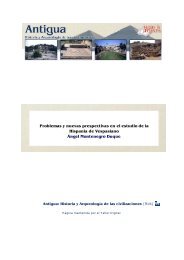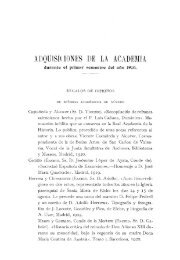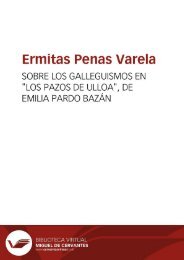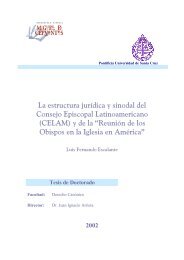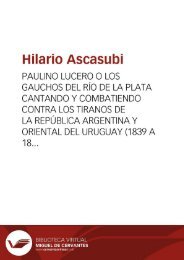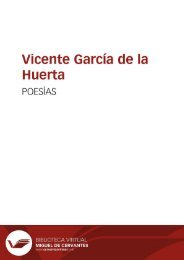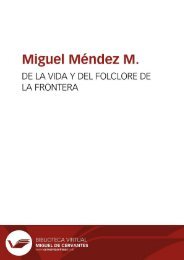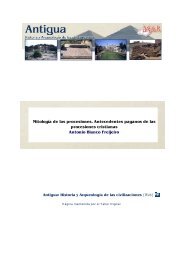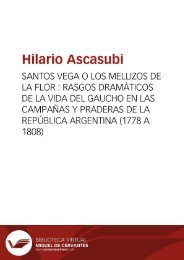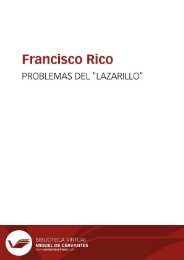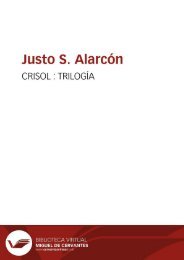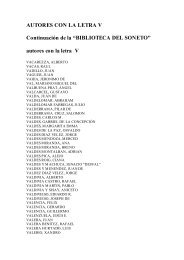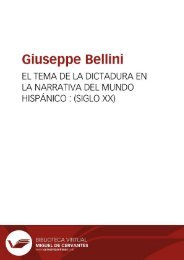You also want an ePaper? Increase the reach of your titles
YUMPU automatically turns print PDFs into web optimized ePapers that Google loves.
Anales galdosianos [Publicaciones periódicas]. Año XII, 1977<br />
« problemática » of La casa de Bernarda Alba, for instance, is the dearth of opportunities afforded to<br />
women in provincial Spain -there is even a note of protest in the work- but there can be no doubt that<br />
Lorca's drama is fundamentally about sexual and spiritual frustration, about Bernarda's daughters and<br />
their existence vis-à-vis Pepe el Romano. So too in <strong>Galdós</strong>: Tristana's ambivalent feelings (admiration<br />
and hatred) for Don Lope and her passion for Horacio and subsequent disillusionment with him are<br />
crucial; they cannot be dispensed with. Frustration exists here too, but the situation is sparked with<br />
irony and mellowed with sentimentality. Lorca was to follow <strong>Galdós</strong>' lead in this type of bittersweet<br />
treatment in his Doña Rosita la soltera . 204<br />
Irony and sentimentality indeed color the theme of Tristana and it is through both of these<br />
perspectives that <strong>Galdós</strong> would inevitably see the problem of feminism in Spain. It was no accident<br />
that he should resort to the time honored literary formulas of the «deceived husband» and the folletín<br />
; for, each, in turn, offered these ingredients. Furthermore, each was a commentary on the traditional<br />
relationships between men and women as reflected for centuries in popular forms of literature.<br />
He saw this cruelty and mischief as expressions of an authentic folk mentality which is epitomized in<br />
the old Spanish maxim, « mujer casada, pierna quebrada y en casa » 205 . The critics are right: <strong>Galdós</strong><br />
arbitrarily, and with malice of forethought, cripples his heroine. But such malfeasance hides a purpose.<br />
By filtering the question of feminism through these popular and literary aphorisms, he seems to be<br />
saying that here is the battle of the sexes; here are the mythic roots of the relationship: the husband<br />
deceived and the woman victimized. (The conflict is indeed immemorial, repeated in literature from<br />
the Hombre que casó con mujer brava of Don Juan Manuel to James Thurber's embattled males<br />
and females.) <strong>Galdós</strong> also seems to be asking: Can it be otherwise? His answer, implied in the final<br />
outcome, is in the negative.<br />
He had asked the same question three years before in the novel Realidad and reached a similar<br />
conclusion. There Augusta, the erring wife, is given the opportunity to confess her guilt and thereby<br />
meet her husband on a higher plane of morality. The husband, Orozco, would like to encourage her<br />
to the task: « Yo había pensado educarte en estas ideas, iniciarte en un sistema de vida que empieza<br />
204 For an examination of the relationship of <strong>Galdós</strong> to this work see: Roberto G. Sánchez, « García<br />
Lorca y la literatura del siglo XIX: Apuntes sobre Doña Rosita la soltera », Ínsula , N.º 290.<br />
205 Emilio Miró suggests a relationship of this maxim to the novel but in an entirely different sense.<br />
( Op. cit. , p. 520.)<br />
152




